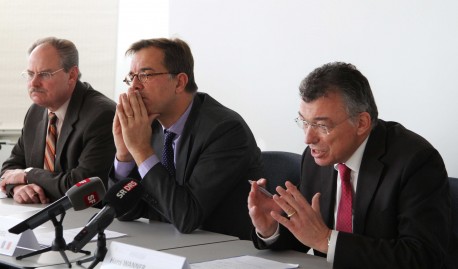Buoni voti per l’autorità di sorveglianza nucleare svizzera
L’Ispettorato federale della sicurezza nucleare (IFSN) agisce in modo indipendente, ha tratto le conclusioni giuste dall’incidente di Fukushima e ha obbligato i gestori delle centrali nucleari ad effettuare continui aggiornamenti. Gli esperti dell’Agenzia Internazionale per l’Energia Atomica AIEA hanno espresso lodi, ma anche proposte migliorative concrete.
Oggi, dopo due settimane, si è conclusa la verifica del lavoro dell’IFSN da parte di un gruppi di esperti internazionali dell’AIEA. Tra il 20 novembre e il 2 dicembre 2011, più di due dozzine di esperti di 14 nazioni hanno analizzato a fondo l’IFSN e il suo lavoro. Durante la cosiddetta missione IRRS, gli esperti dell’AIEA hanno ispezionato diversi impianti nucleari in Svizzera, hanno accompagnato gli ispettori dell’IFSN durante le ispezioni, hanno osservato un’esercitazione di emergenza e hanno verificato i fondamenti legislativi e le normative vigenti in Svizzera.
Il giudizio degli esperti è stato per la maggior parte positivo. “Il nostro team ha avuto una buona impressione dell’IFSN come organizzazione indipendente” ha detto il francese Jean-Christophe Niel, capo del team che ha effettuato la missione. Il gruppo di esperti è rimasto particolarmente impressionato da come l’ISFN ha reagito all’incidente di Fukushima, disponendo rapidamente l’adozione di misure adeguate nelle centrali nucleari svizzere. Gli esperti hanno lodato soprattutto il fatto che in Svizzera gli impianti vengano costantemente aggiornati per mantenerli al passo con lo stato della tecnica.
Gli esperti hanno ritenuto migliorabili soprattutto le condizioni quadro statali, nell’ambito delle quali l’IFSN agisce. Dovrebbe inoltre essere sviluppato ulteriormente l’insieme di regole e normative in vigore per quanto concerne le scorie, la disattivazione e il trasporto.
“I risultati della missione IRRS ci aiuteranno a migliorare costantemente il nostro lavoro. Questo fa parte della nostra cultura della sicurezza”, ha spiegato Hans Wanner, direttore dell’IFSN, il quale ha anche promesso che la Svizzera adotterà misure per attuare le proposte migliorative dell’AIEA.
Il rapporto completo dell’AIEA sulla missione IRRS in Svizzera sarà probabilmente pronto tra tre mesi.
Comunicato stampa dell’AIEA:
International Nuclear Safety Experts Conclude IAEA Peer Review of Swiss Regulatory Framework
2 December 2011 | Brugg, Switzerland – A team of international nuclear safety experts today completed a two-week International Atomic Energy Agency (IAEA) review of the regulatory framework for nuclear safety in Switzerland.
The Integrated Regulatory Review Service (IRRS) mission noted good practices in the Swiss system and also made recommendations for the nation’s nuclear regulatory authority, the Swiss Federal Nuclear Safety Inspectorate (ENSI).
“Our team developed a good impression of the independent Swiss regulator — ENSI — and the team considered that ENSI deserves particular credit for its actions to improve Swiss safety capability following this year’s nuclear accident in Japan,” said IRRS Team Leader Jean-Christophe Niel of France.
The mission´s scope covered the Swiss nuclear regulatory framework for all types of nuclear-related activities regulated by ENSI. The mission was conducted from 20 November to 2 December, mainly at ENSI headquarters in Brugg. The team held extensive discussions with ENSI staff and visited many Swiss nuclear facilities.
IRRS missions are peer reviews, not inspections or audits, and are conducted at the request of host nations. For the Swiss review, the IAEA assembled a team of 19 international experts from 14 countries. The experts came from Belgium, Brazil, the Czech Republic, Finland, France, Germany, Italy, the Republic of Korea, Norway, Russia, Slovakia, Slovenia, the United Kingdom, and the United States.
“The findings of the IRRS mission will help us to further improve our work. That is part of our safety culture,” said ENSI Director General Hans Wanner. “As Switzerland argued at international nuclear safety meetings this year for a strengthening of the international monitoring of nuclear power, we will take action to fulfil the recommendations.”
The IRRS team highlighted several good practices of the Swiss regulatory system, including the following:
- ENSI requires Swiss nuclear operators to back-fit their facilities by continuously upgrading equipment and safety procedures and adopting current technology to maximize nuclear safety;
- ENSI demonstrates openness and transparency by posting significant documents on its website, including reports on safety research, applicable lessons from foreign nuclear power plants, and safety assessments for all Swiss nuclear power plants; and
- ENSI’s comprehensive and user friendly management system enables the regulator to work effectively and efficiently to oversee Swiss nuclear safety.
The IRRS team also made recommendations to improve the Swiss regulatory system, including the following:
- As ENSI was established as an independent regulatory body in 2009 as part of a revised government framework, the Swiss government should actively monitor how this new framework is working and make improvements as needed;
- ENSI needs the authority to set conditions for licensing nuclear activities and to issue regulatory requirements; and
- The Swiss regulatory framework should continue evolving its graded approach to safety, and further develop its inspection efforts in all areas, especially in waste, decommissioning and transport.
In a preliminary report, the IAEA has conveyed the team´s main conclusions to ENSI, and a final report will be submitted to the authority in about three months. ENSI has told the team that it will make the report public. The IAEA encourages nations to invite a follow-up IRRS mission about two years after the full mission has been completed.
About IRRS Missions
IRRS missions are designed to strengthen and enhance the effectiveness of the national nuclear regulatory infrastructure of States, while recognizing the ultimate responsibility of each State to ensure safety in this area.
This is done through consideration of both regulatory, technical and policy issues, with comparisons against IAEA safety standards and, where appropriate, good practices elsewhere.
More information about IRRS missions is available on the IAEA Web site: http://www-ns.iaea.org/reviews/rs-reviews.asp


